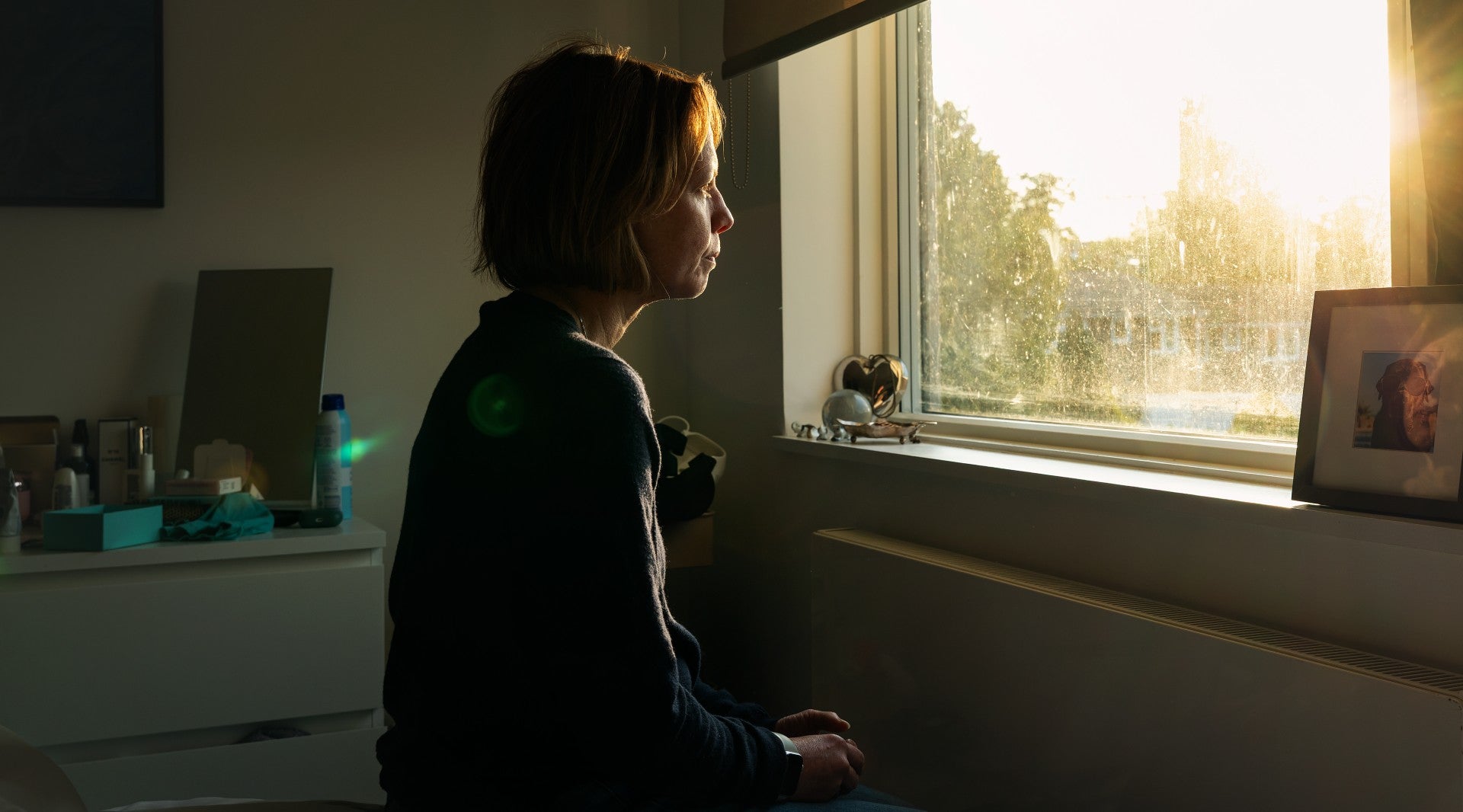Beverly was 41, had two children and was contemplating a third when her first mammogram revealed a lump. Diagnosed with breast cancer, Beverly, who lives in Portland, Oregon, opted for chemotherapy, immunotherapy and a double mastectomy.
She knew the chemo would affect her fertility. What she didn’t know was that the type of cancer she had would necessitate hormone suppression drugs that would lead to severe menopausal symptoms.
For Beverly, now 46, that meant hot flashes, vaginal atrophy, zero libido, thick curly hair that turned straight, sparse and wispy, and what she describes as “old lady bones.”
“If I’m lucky enough to live to 95, am I just going to crumble into a pile of chalk?” she said.
Beverly, who asked that her last name be withheld for privacy reasons, is not alone in experiencing severe menopausal symptoms following breast cancer or ovarian cancer treatment or prophylactic surgery, which entails breast and/or ovary removal, sometimes along with removal of the uterine and fallopian tubes.
Risk-reducing surgery is often recommended for women who carry a BRCA1 or BRCA2 gene mutation, which significantly increases the risk of breast and ovarian cancer. These mutations are found in Ashkenazi Jews — in both women and men — at rates about 10 times higher than in the general population.
For women who test positive, surgery can reduce the risk of developing ovarian cancer by over 75%. There may also be reduced risk of breast cancer, though research findings are mixed.
While hormones gradually decline as older women approach menopause, younger women who undergo surgery-induced menopause may experience a sudden and dramatic hormonal crash.
“Natural menopause is gradual; surgical or medically induced menopause is intense,” said Elana Silber, CEO of Sharsheret, a Jewish nonprofit organization that provides support, counseling, patient navigation, financial assistance and education in the United States and Israel for those facing breast cancer and ovarian cancer.
“Doctors focus on immediate cancer treatment plans; Sharsheret helps support and educate women about what comes next,” Silber said. “We highlight these critical issues so that women know to raise them with their healthcare providers, and we make sure they don’t face those questions alone.”
As public discussions about menopause have become more common, Sharsheret has fielded a growing number of inquiries from young women seeking information on the subject and ways to connect with peers. Many are navigating an abrupt and frightening transition for which they never prepared, and they sometimes describe it as even more traumatic than their breast surgeries.
“Menopause brought on by breast cancer surgery or treatment doesn’t follow a normal, natural progression,” said Adina Fleischmann, Sharsheret’s chief services officer.
Sharsheret has responded by connecting women with social workers and genetic counselors to help them understand both the medical and emotional impact of treatment-induced menopause.
Through peer-to-peer connections, survivors are matched with others who have gone through the same surgeries and drug regimens. They get real-world perspectives that many women say they don’t receive from their physicians.
The organization also provides survivorship kits, medical webinars, and tailored educational materials on sexual health, bone strength, fertility preservation, and non-hormonal strategies for coping with hot flashes, sleep disruption, and vaginal dryness.
Beyond the physical symptoms, it’s not uncommon for women undergoing early menopause to experience depression, according to Dr. Gila Leiter, an Ob/Gyn affiliated with New York’s Mount Sinai Hospital and a member of Sharsheret’s medical advisory board.
“Knowing what symptoms to expect — and expect pretty suddenly — is very important,” Leiter said.
Liora Tannenbaum, Sharsheret’s Israel regional director, underwent risk reducing surgeries as a result of being a BRCA carrier. She said she was less fearful of the physical recovery from having her ovaries and uterus removed than when she did her double mastectomy, but she was terrified of the emotional and mental recovery.
“As much as I looked for people to talk to for support who had been through this, I found that so many women were suffering in silence,” Tannenbaum said. “The lowered tones and discomfort around the entire conversation caught me by surprise.”
One woman, M., 44, recalled symptoms “hitting like pile of rocks” after surgery five years ago to remove her ovaries, fallopian tubes and uterus. (She asked to use only an initial to preserve her privacy.)
Just 23 when she lost her mother to ovarian cancer, M. was 28 when she learned she carried the BRCA1 mutation. She spent several years considering her options before ultimately choosing to remove her ovaries and uterus.
“It took me a long time,” M. said. “The biggest concern is you want to have kids, and when you have these surgeries you can’t have kids.”
Most doctors, including M.’s, recommend such surgery by age 40. By 39, after two children, a third miscarriage, and ongoing exams, a suspicious finding — which proved to be nothing — made her doctor insist on risk-reducing surgery if she wanted to live to see her kids’ bar mitzvahs.
“I was already considering surgery, and that scare pushed me to do it,” M. said. “I’m glad I did.’”
But the sudden loss of hormones – not just estrogen, but also progesterone and testosterone – left her with vaginal dryness, loss of muscle mass, dry skin, diminished libido and a return of asthma. M., now a nurse who volunteers for Sharsheret’s peer network, noted that she wasn’t told during her medical appointments what to expect.
“The message was: ‘Don’t worry about it. We’ll give you a low-dose hormonal patch and everything will be fine,’” she recalled.
Menopausal symptoms aren’t severe for all women, and sometime they’re only temporary.
Farrah Zweig was 31 when she was diagnosed with hormone-positive, HER2-negative breast cancer. She had a lumpectomy, radiation and chemotherapy. She also took Lupron, a hormone suppression drug, which put her in menopause.
“My medical team did not discuss menopause with me,” said Zweig, now 42. “My only source of information was from people who had gone through it due to age, not as a result of a medical treatment like mine.”
She experienced the hot flashes and difficulty sleeping, which she expected, and also had a tough time losing weight she’d gained during chemo.
Leiter said physicians often don’t inform patients about treatments that might help their symptoms — even those that don’t involve hormones. She noted that antidepressants can reduce hot flashes and mitigate some of the irritability or emotional fluctuations. Meditation, cognitive behavioral therapy for insomnia, and laser treatments for vaginal dryness also can be effective.
“Knowing what you may feel and how you’re going to handle it, what medications are available, what support systems you’re going to have and maybe lining up your therapist or acupuncturist in advance makes all the difference,” Leiter said.
To speak with a social worker or someone at Sharsheret, visit www.sharsheret.org or call 866.474.2774.
JTA has documented Jewish history in real-time for over a century. Keep our journalism strong by joining us in supporting independent, award-winning reporting.
This article was sponsored by and produced in partnership with Sharsheret, the national Jewish breast cancer and ovarian cancer organization. This article was produced by JTA’s native content team.
More from Sharsheret




